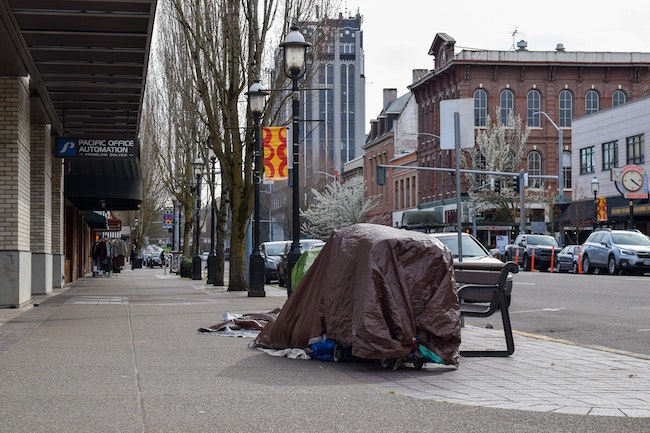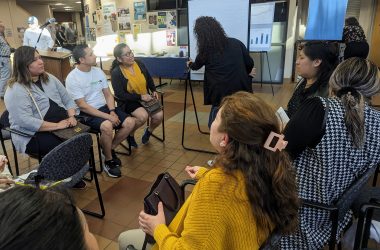 The Salem City Council declared a state of emergency on March 17, a move that will prohibit people from loitering on public property. (Saphara Harrell/Salem Reporter)
The Salem City Council declared a state of emergency on March 17, a move that will prohibit people from loitering on public property. (Saphara Harrell/Salem Reporter)
NOTE: Salem Reporter is providing free access to its content related to the coronavirus as a community service. Subscriptions starting at $5 a month help support this.
Salem on Tuesday evening prohibited loitering on sidewalks and partially repealed the camping ban in an effort to slow the spread of COVID-19 among people considered more vulnerable to getting the novel coronavirus.
The move comes as Salem city officials were less than a week away from approving an ordinance that would sweep downtown streets of homeless people who have been congregating under awnings for months.
Instead, city councilors unanimously declared an emergency Tuesday night, prohibiting until April 28 gatherings of two or more people on any public space within the city. Public gatherings are defined as two or more people remaining in the same area for ten minutes or more.
City Attorney Dan Atchison said the restrictions will be applied uniformly, including for sidewalk cafes.
Councilor Cara Kaser said the restriction aims to keep people from gathering in groups in public spaces.
“It doesn’t really matter if its two or four or ten. This stuff transmits,” Kaser said. “If we permit any more than one person to gather, we’re risking exposure to other groups of people.”
The are some exceptions to the sidewalk loitering rules including people with a medical emergency, those with a physical disability who use a wheelchair or walker, children in strollers, and sitting on a bench or at a bus stop.
The move to re-open camping came at the advice of homeless service providers in Salem, who said that homeless people should be allowed measures to self-isolate with a tent.
It wasn’t immediately clear how the move would impact the proposed sit-lie ordinance, which councilors are poised to vote on at their Monday, March 23, meeting.
“My concern is that for the last couple years we’ve been going around and around on sit-lie. I understand why we’re doing what we’re doing now, but it kind of has the practical effect of enacting a sit-lie ordinance,” Councilor Tom Andersen said while calling in to Tuesday’s meeting.
Campsites with 10 or less people will be allowed in “unimproved” areas of Wallace Marine and Cascades Gateway parks and must be spaced 50 feet apart.
City Manager Steve Powers said the city won’t provide portable restrooms, garbage disposal or hand washing stations at the campsites.
Powers said the two city parks, one in west Salem and the other in east Salem near Interstate 5, have public restrooms.
“We are in a pandemic and there will be a need for people to leave the sidewalks for people to not congregate in ways that endanger their own health and the communities’ health,” he said.
Jimmy Jones, executive director of the Mid-Willamette Valley Community Action Agency, said his agency is encouraging homeless residents to spread out across the city for now.
“There aren’t a whole lot of good options for this particular virus for this group of people,” he said.
In a letter to Powers dated March 17, Jones said his agency would provide homeless people with a tent and sleeping bag.
“Allowing the homeless to camp in Wallace Marine and in Cascades Gateway is the best of limited options available to the city, given the current public health conditions in the downtown, and the high probability of COVID-19 community spread among our homeless neighbors,” Jones wrote.
Last weekend Be Bold Street Ministries handed out 75 sleeping bags at Cascades Gateway Park.
Jones said it’s not wise for highly vulnerable to contracting the disease to congregate, referring to a city plan erect a large covering in Marion Square Park to accommodate up to 70 people.
Powers said told councilors that city officials were no longer advocating such a structure.
Ashley Hamilton, director of The ARCHES Project, said her organization is encouraging homeless people to distance themselves from people in respiratory distress and practice good hygiene.
“It takes a lot of education and outreach to get that message well received and to employ it,” Hamilton said.
The agency made additional changes to the day room at ARCHES, only allowing 25 people in at a time and creating a wait list. At that point, the day room will cycle people in every hour, so everyone has access to services.
Church at the Park closed its warming shelter site because providers couldn’t ensure proper spacing.
On Monday, Capital Park Wesleyan Church opened with mats spaced six feet apart in a large gym that sleeps 48.
“It affords us the ability that if someone is showing respiratory symptoms, we can isolate and separate appropriately,” Hamilton said.
The Mid-Willamette Valley Community Action Agency is in a social distancing phase, advancing from the prevention phase it was in last week.
It involves doubling up on preventative efforts and not sharing communal items like pens, pencils and ID cards.
Hamilton said ARCHES is still working on getting a handwashing station but is struggling because they’re in high demand.
She said while both the federal Department of Housing and Urban Development and the Centers for Disease Control and Prevention recommend such stations, they can have unintended consequences.
“Those can be used as a means for someone to get intoxicated,” Hamilton said.
She said reports in the press about the vulnerability to the virus is stoking fear in the homeless population.
“The population knows what’s going on. They are involved. They are aware conversations are being had without them and that makes them afraid,” Hamilton said.
Have a tip? Contact reporter Saphara Harrell at 503-549-6250, [email protected] or @daisysaphara.









